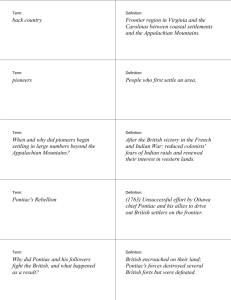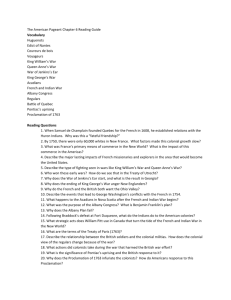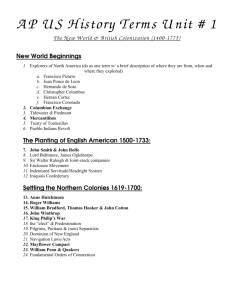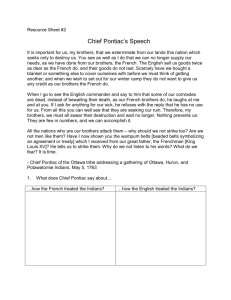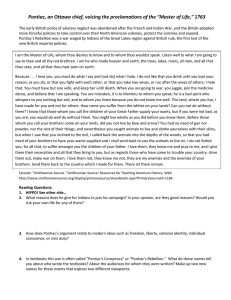Proclamation of 1763 - White Plains Public Schools
advertisement
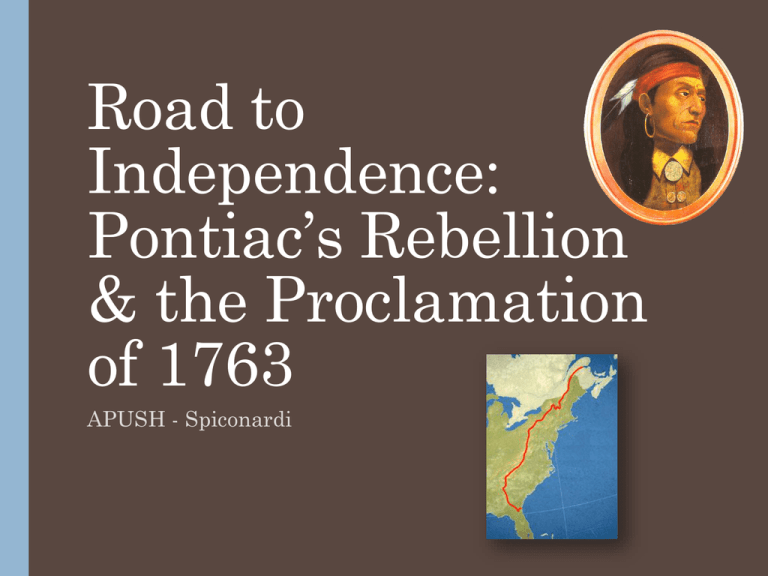
Road to Independence: Pontiac’s Rebellion & the Proclamation of 1763 APUSH - Spiconardi Pontiac’s Rebellion • After the Seven Years’ War, Indian land was ceded to the British by the French under the terms of the Treaty of Paris (1763). • Indians were resistant to the British and their encroachment on Indian land • SEE DOCUMENT From Pontiac, Speeches (1762 & 1763) Englishmen, although you have conquered the French you have not yet conquered us! We are not your slaves. These lakes, these woods, and mountains were left us by our ancestors. They are our inheritance; and we will part with them to none. Your nation supposes that we, like the white people, cannot live without bread and pork and beef! But you ought to know that He, the Great Spirit and Master of Life, has provided food for us in these spacious lakes, and on these woody mountains. [The Master of Life has said to Neolin:] I am the Maker of heaven and earth, the trees, lakes, rivers, and all else. I am the Maker of all mankind; and because I love you, you must do my will. The land on which you live I have made for you and not for others. Why do you suffer the white man to dwell among you? My children, you have forgotten the customs and traditions of your forefathers. Why do you not clothe yourselves in skins, as they did, use bows and arrows and the stone-pointed lances, which they used? You have bought guns, knives, kettles and blankets from the white man until you can no longer do without them; and what is worse, you have drunk the poison firewater, which turns you into fools. Fling all these things away; live as your wise forefathers did before you. Pontiac’s Rebellion • In 1763, Indians of the Ohio River Valley and Great Lakes launch an uprising against British rule. • Indians attacked settlements and British soldiers and settlers attacked Indians “Pontiac's War was unprecedented for its awful violence, as both sides seemed intoxicated with genocidal fanaticism” ~Historian, David Richter Pontiac’s Rebellion Amherst: "Could it not be contrived to send the small pox among those disaffected tribes of Indians? We must on this occasion use every stratagem in our power to reduce them.” Bouquet: "I will try to inoculate the Indians by means of blankets that may fall in their hands, taking care however not to get the disease myself." Amherst: "You will do well to try to inoculate the Indians by means of blankets, as well as to try every other method that can serve to extirpate this execrable race." Gen. Jeffrey Amherst Proclamation Line (1763) • Prior to Pontiac’s Rebellion, the British were drafting a royal proclamation • The British government had feared constant conflicts between settlers and Indians and Pontiac’s rebellion confirmed those fears • The Proclamation Line of 1763 Land beyond the line is reserved for Indians No settlements beyond the line No private sale of land beyond the line Settlers beyond the border much vacate that land If you’re a colonist, how do you react to the Proclamation Line? Why? Salutary Neglect • Salutary Neglect an unofficial policy of avoiding imperial enforcement of laws on the colonies in the 17th and 18th centuries by the British government Most colonists ignored the proclamation and settled west in even greater numbers After 1763, Great Britain would end salutary neglect
